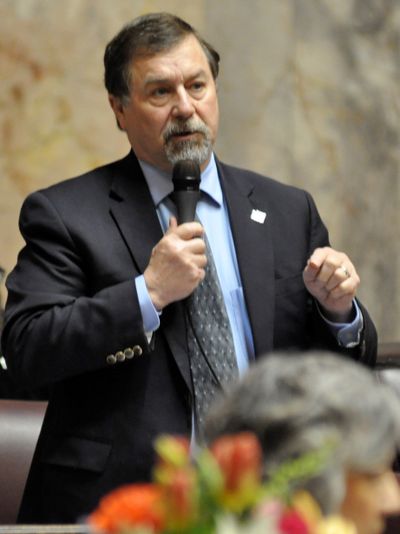Washington Legislature passes $70 billion operations budget before adjourning Sunday

OLYMPIA – If one of the main jobs of a government is to spend money on things state residents want or need, the Legislature went home Sunday night having done that job with relatively little acrimony.
The House and Senate both passed a $70 billion general operating budget that covers most state programs and salaries, along with public schools and universities.
Supporters like Sen. Christine Rolfes, D-Bainbridge Island, described it as an “ambitious and responsible spending plan.” It increases state money for things that members of both parties want, like special education, free school lunches, affordable housing and public safety.
Detractors like Sen. Mark Schoesler, R-Ritzville, said it had serious shortcomings and broken promises.
“We all like to spend money,” Schoesler said. But the budget “squanders” money on things the state shouldn’t, like studying the removal of the Snake River dams. That’s a federal issue, not a state issue, he contended.
The operating budget passed the House on a mostly partisan 58-40 vote. In the Senate, eight Republicans joined Democrats in passing it 37-12.
On much more comfortable margins Saturday, lawmakers passed the state’s second-largest budget, a $13.5 billion transportation plan that covers construction and repairs of highways and bridges, with additional money for mass transit and the Washington State Patrol.
The final version includes money for many projects Gov. Jay Inslee had proposed delaying because of possible funding shortages, including $166 million for work on the North Spokane Corridor.
“I think we came up with a budget that moves the state forward,” Sen. Curtis King, R-Yakima, said.
It passed the House 98-0 and the Senate 46-3. Among the opponents was Sen. Nikki Torres, R-Pasco, who objected to the $5.5 million set aside to study the effects to the transportation system of removing the Snake River dams. Studying the dams’ removal has been studied multiple times, she said.
“We could use the funds better,” Torres said.
Also on Saturday, lawmakers gave final approval to a $9 billion Capital Construction Budget, which passed both chambers without a single “no” vote. It has nearly $670 million for water pollution control projects, $717 million for climate projects, $570 million for affordable housing projects, $278 million for public school construction and $224 million for community-based behavioral health facilities.
One section of the Capital Construction Budget sets aside $24 million for improvements to sports facilities around the state, including $6.3 million for improvements to Spokane County’s Avista Stadium.
Action on guns, abortion and school lunches
Spending money isn’t the only thing lawmakers did during their 105-day session.
They also passed bills on a wide range of government policies including health care, housing, guns and abortion.
One that may have drawn the most attention, amassing hours of debate, was a bill to ban the sale, distribution, import and manufacture of assault weapons. Other firearms legislation included a bill requiring safety training and a 10-day waiting period to purchase any gun.
Another requires gun dealers to adopt reasonable controls to ensure their weapons don’t end up in the wrong hands.
As usual, the abortion topic split the Legislature on partisan lines. In response to the U.S. Supreme Court decision to overturn Roe. v. Wade last year, the Legislature passed bills to protect abortion providers and patients while expanding access. Lawmakers also shielded providers and patients from out-of-state subpoenas, arrests, investigations and extradition relating to reproductive health care.
Another bill prohibits copays and deductibles for abortions, while another protects Washington abortion providers who legally provide reproductive care from out-of-state lawsuits.
The Legislature also approved Inslee’s purchase of a three-year supply of the abortion medication mifepristone and the Department of Corrections’ ability to distribute the drug outside of its facilities.
The My Health My Data Act will restrict the release of certain health data, requiring a consumer to consent to any collection or sharing of it.
Another contentious bill that passed the Legislature in the closing days of the session allows a runaway minor seeking an abortion or gender-affirming care to stay in a homeless shelter without the facility informing their parents. The shelter would instead notify the Department of Youth and Family Services.
The operating budget allocates $85 million over the next two years to expand access to free school meals in areas with the most need, a proposal sponsored by Rep. Marcus Riccelli, D-Spokane.
In addressing concerns from law enforcement about restrictions on the ability to engage in high-speed chases, lawmakers changed the standard to “reasonable suspicion” a suspect has committed certain crimes, which is a less stringent standard than the current requirement of “probable cause.”
Among issues lawmakers discussed, but ultimately on which they did not agree, was a change to the real estate excise tax, lowering it for home sales on the lower end of price ranges and raising it on the upper end.
They also opted not to lower the blood alcohol content threshold for driving under the influence from 0.08% to 0.05%.
Another idea discussed that didn’t become law was a bill to officially adopt “The Evergreen State” as Washington’s nickname. It remains, however, the name of the state college in Olympia and the slogan on the state license plates.
But lawmakers did pass a bill that names the Suciasaurus the state’s official dinosaur, based on a dinosaur fossil discovered on Sucia Island in the San Juans.